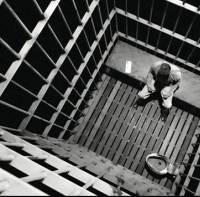- About Us
- Columns
- Letters
- Cartoons
- The Udder Limits
- Archives
- Ezy Reading Archive
- 2024 Cud Archives
- 2023 Cud Archives
- 2022 Cud Archives
- 2021 Cud Archives
- 2020 Cud Archives
- 2015-2019
- 2010-2014
- 2004-2009
 |
Cud Flashes In The Pan |
Dystopian stories help us consider what tomorrow may bring if we aren’t mindful of today. In a world where so much is wrong, it’s important to envision how much worse the world could get if we ignore it all. Consider Huxley’s Brave New World, Rand’s Anthem, Orwell’s Nineteen Eighty-Four, and Atwood’s The Handmaid’s Tale, for starters—all excellent cornerstones of dystopian fiction, if you’re interested. I recently edited the anthology Atheist Tales, which featured several dystopian stories and tells me that many authors will continue exploring potential bad futures. Let’s hope we all consider them, learn from those lessons, and avoid them at all costs. Here are a few brief near-future social-science-fiction tales for your dystopian displeasure.
“Expectations”
By David M. Fitzpatrick
Jack and Linda were married in a grand affair, but they were so wild with lust even they barely noticed. Sex outside of marriage was illegal, so their mandated three-year courtship was a difficult one. When they finally tumbled to the bed in the honeymoon suite, it didn’t take long for the wedding dress and tuxedo to come off. They rutted like animals, lost in the wonders of the sex they’d long dreamed of.
Just a week later, Linda announced she was pregnant. They were overjoyed, of course, and Linda reported her pregnancy to the Bureau of Children. “You know what this means,” she said to her husband.
He sighed. “I know, no sex until after the baby’s born. I’m sure I can make it.”
He didn’t, and neither did she. One more week later, they got carried away with heavy petting and necking, and he got her undressed. She managed to stop him. “We can’t,” she breathed. “If they find out...”
“They won’t,” Jack said.
So they rutted like animals again.
But the Bureau found out. During her prenatal checkup, a nurse swabbed Linda and tested for semen. When it came back positive, Linda was rushed into protective custody and Jack was placed under arrest, charged with sexually abusing a minor child—the two-week-old embryo inside Linda.
“Let that be a lesson to him about the rights of all human beings,” said the Bureau at Jack’s sentencing hearing, at which the judge sent him to prison for ten years.
“The Scarlet ’A’”
By David M. Fitzpatrick
Jane’s sin made her the worst of humanity. The Church made her broadcast her shame with a scarlet letter “A” tattooed on her forehead. Even Hester Prynne hadn’t been so marked, but Jane’s sin was far worse than Hester’s, one that saw her living as a member of the lowest caste of society.
It was a sin of choice, since the Church allowed anyone free will. Her family and friends had long ago abandoned her, unwilling to share her shame. Jane spent so many nights crying herself to sleep in loneliness and despair, and in that dark place or misery she often considered changing her ways—not truly atoning, but pretending such, as the Church had often told her she should do. Ultimately, she knew she was too honest and principled to become a lying hypocrite like the rest of them.
The Church ensured that she was labeled for all to see. She could work for reduced wages. She could be in public, but if even a bit of that “A" were obscured by hat or hair, she’d be arrested. She could enter into romance, if only she found a man who also had a crimson “A” on his forehead.
One day, she met Arthur, who had such a tattooed letter. They were immediately drawn together. He was relaxed and completely at ease with his low station in life, and from that first meeting Jane was inspired. They soon became a couple and moved in together. To Jane, it was odd to find strength in numbers when there were only two of them, but she felt more emboldened than ever.
Persecuted by the world, barely allowed to exist, part of the worst minority on the planet, Jane refused to feel shame for her Church-claimed sin. They could make her wear the red “A” on her forehead, and they could turn society against her, but she refused to feel shame. Arthur made it easier—and to have someone to talk to about their shared sin made all the darkness in her life worth it.
So Jane came to wear her crimson “A” with pride—honored to let the world know she was an Atheist.
“It’s Not My Default”
By David M. Fitzpatrick
John knew he shouldn’t have cut it so close. He’d spent eighty-eight days overseas, and he thought there was no way he’d take two days to get back. But Murphy’s Law struck viciously. His first flight was canceled due to a sick pilot, and he was sixteen hours waiting on a replacement. The second flight returned to the terminal because some drunk scuffled with the flight crew; another long wait. The final flight had to turn back a quarter of the way through the trip due to engine problems. The next aircraft was diverted around a gigantic hurricane system.
So there was less than an hour left as his flight approached the Logan Airport in Boston. John was worried. If he didn’t make it because of his stupid risk-taking, he’d never forgive himself. Now the plane was stuck in a holding pattern.
He asked the flight attendant yet again about how soon they’d land; she glared at him, annoyed. “Sir, we’ll land when they let us,” she said.
“I’m sorry,” he said, sweat dripping down his face. “It’s just that... I’ll default in about forty minutes.”
She gave a start, her mouth sagging. “I’m so sorry. I’ll let the captain know, but... I don’t think...”
He nodded her away, returned to his seat. But nearby passengers had heard him, and he listened to the incredulous whispers roaming the airplane. Why would he cut it so close?... I can’t imagine defaulting... Can you even think of what it would be like?... I’d never leave for more than two months, just in case...
Out the window, he watched the ocean below as the airplane circled endlessly. How could he have been so stupid? He’d worked so hard... and now he’d default. Defaulters usually did it on purpose; in eighty years, there had been maybe a half-dozen accidental defaults.
The attendant returned. “The captain has radioed ahead,” she said, solemn and low. “They’re trying to get us in quickly, but... look, we’ll get you off the plane first. You just have to get into the terminal in time. You might make it...”
There were barely ten minutes left when they finally began their descent. John watched out the window as the plane dropped low over the water towards the runway. What would his family think when he defaulted? His friends? He’d lose his job. He’d be five years trying to fix it. He fought back the tears, gritting his teeth and clenching his fists.
Six minutes remained when the plane touched down, and four when it turned down the ramp towards the terminal. The final minutes ticked by as the plane made it to the gate. The attendant rushed him out of his seat, and the other passengers were gracious enough to stay seated while he ran. When they wrenched the door open, his watch said he had thirty seconds left. He burst out of the plane, thundered down the airbridge, and exploded into the customs area, and for a fleeting moment he felt his heart swell because he’d made it.
The final minutes ticked by as the plane made it to the gate. The attendant rushed him out of his seat, and the other passengers were gracious enough to stay seated while he ran. When they wrenched the door open, his watch said he had thirty seconds left. He burst out of the plane, thundered down the airbridge, and exploded into the customs area, and for a fleeting moment he felt his heart swell because he’d made it.
But then he saw the official government clock on the wall, even as the uniformed customs agents approached him. The clock was a minute ahead of his watch. Instead of seconds to spare, it was already too late.
“No!” he cried.
“John Ballard?” one of the agents said as the pair flashed badges.
“Please, don’t do this,” he said. “I’m begging you.”
But the agent ignored him. “John Ballard, you have been out of the country for ninety days and one minute, and have therefore defaulted,” he announced. “Under the United States True Loyalty Act, an act to preserve the integrity of real patriots in defense of traditional American values, your citizenship is hereby revoked. You may apply to be a resident alien at the desk...”
He staggered back against the wall and begin to cry.
“One Man and One Woman”
By David M. Fitzpatrick
“Milena’s finally coming by with her new boyfriend,” Mrs. Sutter told her husband.
“It’s about time,” Mr. Sutter said, sipping his coffee. “I’m disturbed about this engagement talk—we haven’t even met the lad.”
“Lad! Goodness, he’s nine years older than her, nearly at the maximum age difference allowed by law.”
Mrs. Sutter read the news on the holoscreen, occasionally glancing out the kitchen window as she watched for Milena’s arrival. “Thank heavens we raised her right. Not like her friend Jennifer—you know, the girl who likes... other girls.”
“She can like other girls all she wants," Mr. Sutter grumbled. “She just can’t marry them. Thank God they passed those marriage laws. Marriage is between one man and one woman, no exceptions. No same-gender marriages, no marrying animals, no people pretending to be other genders marrying anyone—good, smart laws.”
Milena’s hovercar arrived then, sinking down into the parking area outside to float just above the ground. A pretty young girl in long skirts and her male passenger got out, clasped hands, and headed for the door. The pair burst into the kitchen.
“Mom, Dad—here he is,” Milena said with a smile. “This is Solumar.”
Mr. Sutter extended a hand to the grinning young man. “A pleasure to meet you, Solumar. That’s quite a name you have; what’s it mean?”
“It’s from an ethnic group on Centaurus, sir,” Solumar said, clasping the man’s hand.
Mrs. Sutter scrunched her brow at him. “Why would your parents give you such a name?”
Solumar looked at Milena, who looked very serious. “Mom, Dad... Solumar’s parents are geneticists. His father is Terran, but his mother is a Centauran. Solumar is the first Terran-Centauran hybrid.”
The Sutters froze, staring at the young man as if realizing how big and green his eyes were, how his hair was thick like straw and too yellow to be called blond, how his skin had a golden sheen to it, and how he had six fingers on each hand.
“No, Milena!" Mrs. Sutter cried. “Solumar, understand... we want our daughter to marry, and marrying a non-human isn’t legal on our world.”
“That’s not true,” Milena interjected. “The law says marriage must be between one man and one woman. He’s a man; I’m a woman.”
“That’s perverting the spirit of the law,” Mr. Sutter said, eyes dark. “I’ll speak to the authorities tomorrow to ensure it won’t happen. The law will be amended to say marriage is between one fully human male and one fully human female.”
Milena sighed, moving in close to let Solumar wrap a protective arm about her. “I knew you’d say that. So Mom, Dad... we’ll be married on Centaurus, where their laws don’t restrict the freedom to love, and to choose partners.”
***
They were married on Centaurus three months later, and they were happy for a year before Solumar came home one day with a Centauran female: gold-skinned, emerald-eyed, purple-haired. He introduced her as his wife.
“But I’m your wife,” Milena said, incredulous.
“She’s my second,” he said. “Centauran law allows me seven. And no wife has a choice in the matter.”
They argued for hours, but Solumar wouldn’t budge. Milena finally demanded a divorce.
“Under Centauran law, I have to agree to a divorce—and I won’t,” he said. “You’ll grow to like this arrangement, Milena. Just think—on Earth, marriages with multiple wives are outlawed. I’d think you, of all people, would appreciate the diversity!”
“I do,” she said, weeping. “A person should be able to have multiple spouses. But I should be able to choose to not be part of such a relationship.”
Solumar laughed. “Dear Milena... what sort of world would this be if we let everyone make such decisions for themselves?”
As Solumar retired to the bedroom make love to his newest wife, Milena whispered to herself, “A perfect world.”
“Selfish Bastards”
By David M. Fitzpatrick
Humans are selfish bastards. There’s no escaping it. That’s what they reasoned when they came up with The Game. The Game is basically dodgeball, but if a ball hits a person, it electrocutes him on the spot. The referees drag away bloated, smoking corpses, and play resumes.
It was all from some international decree that everybody had agreed to; each nation sent citizens, who competed for several days until the best of the best made it to a final round. The purpose was to eliminate war by replacing it with this insane system. Did I mention humans are selfish bastards? Stick us in a life-or-death situation and couple it with the human competitiveness, and you had great television. The guy who came up with the idea got from old science-fiction stories and films as a way to keep world peace through limited destruction. Hell of a plan.
I was chosen, and I was scared. If you didn't participate, they’d execute every friend and family member you had. So I practiced for months, with everyone throwing balls at me from dawn til dusk. I got pretty good, and also excelled at throwing. I’d do anything to be the last man standing.
But then I met Callie before the first round. They bunked us all together in co-ed dorms for the month of The Game; men and women competed separately until the final round, so we’d never face each other until the final round, if we both lasted that long. So we hit it off and became the best of friends, which they warned us about; getting attached to someone made it harder to kill that person later. But we couldn't help our feelings.
We both made it all the way, but that meant we had to face each other on that final day. That last night, Callie sneaked into my now-empty bunkroom. She cried and told me she was in love with me, and I cried and told her I loved her. We didn't want to die, so there in the darkness we made a solemn promise to do two things: first, to be the last two survivors; and second, to not kill each other. Callie, you see, had found a loophole.
"We just keep missing," she said, clutching me tightly. "We throw wide, high, low. The rules don't prohibit it. Eventually, they'll have to call the match, and we'll be together forever."
We kissed and made plans for our triumphant life together, and then we made love again. It was the purest bliss, the greatest feeling ever. It seemed utterly out of place amid a barbaric thing like The Game.
The next day, a computer assigned the ten of us wall positions, and we took turns trying to kill the others. But we were the best of the best, throwing those lightning-loaded balls like artillery shells, and we leaped and ducked, sidestepped and spun, bent and jumped to avoid them. The first death didn’t come until the eighth round. The battle raged fifty-two rounds before Callie and I were the last two contestants.
She threw first. I stood perfectly still, my eyes closed, listening to the balls smacking the wall to my left, to my right, above my head. I imagined the television commentators crying out in shock, and billions of people screaming at their screens.
The ref called for the switch. I opened my eyes as Callie approached, smiling. I returned it, met her halfway, and kissed her. We wrapped arms about each other, and let the world go crazy. Then she took her place against the wall, smiling, and closed her eyes.
I hit her with the first shot, square in the chest. Her eyes flew open as her body sizzled and, for a split second, I saw the horror and betrayal on her face—a look of utter and complete misery. And then her body hit the floor, shook violently for an agonizing moment, and then she was gone.
I don't talk about Callie with anyone. But every night I see that look on her face, and I know the terrible person I am. I knew all along the loophole wouldn't have saved us; they'd have just amended the rules during the competition, and executed us both if need be. The end result was one of us would die, or both of us. Survival instinct took over, that's all. It took over the night Callie and I made love. While we held each other and I made those false promises to her, I already knew what I'd do. I’m a selfish bastard, and it kept me alive.
I’d like to believe I never could have done something so cold if I hadn’t had a choice, but I guess I always did.
David M. Fitzpatrick is a fiction writer in Maine, USA. His many short-stories have appeared in print magazines and anthologies around the world. He writes for a newspaper, writes fiction, edits anthologies and teaches creative writing. Visit him at www.fitz42.net/writer to learn more.
